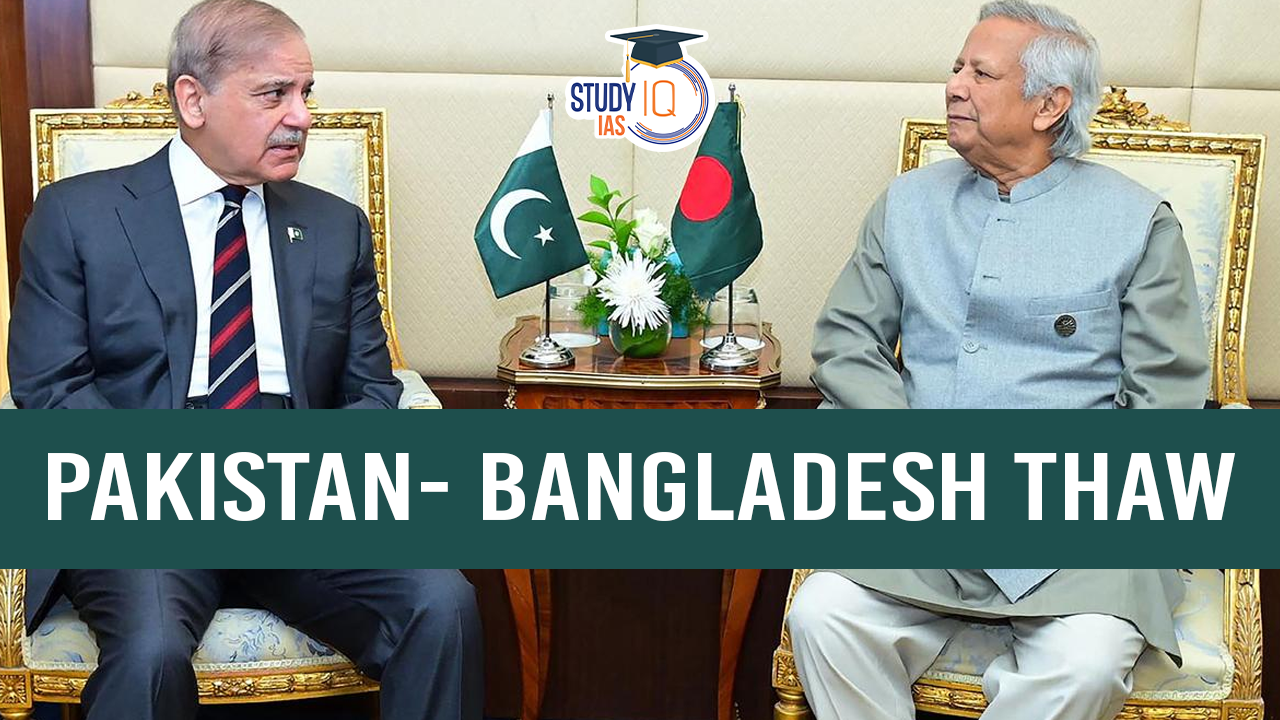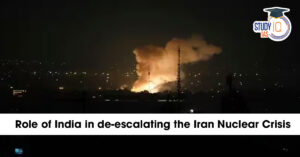Table of Contents
Context: The emergence of Muhammad Yunus as Chief Adviser to the interim Bangladesh government has led to renewed interactions with Pakistan.
Bangladesh-Pakistan Relation Background
- Bangladesh’s independence from Pakistan in 1971 resulted in strained bilateral relations, with historic grievances acting as a major barrier to reconciliation.
- Sheikh Hasina’s tenure (15 years) saw frosty ties with Pakistan, worsened by her pro-India stance and her family’s history with the Pakistani ruling elite.
- 2016 diplomatic tensions: Both countries expelled diplomats, highlighting deteriorating relations.
Recent Developments in Pakistan- Bangladesh Relation
- Bangladesh hosted a high-level Pakistani military delegation in Rangpur.
- A visit by Lieutenant-General S.M. Kamr-ul-Hassan, the Bangladesh Army’s second-in-command, to Rawalpindi to meet with Pakistan’s Army, Navy, and Air Force chiefs.
- Resumption of direct flights between Dhaka and Islamabad.
- Bangladesh’s participation in Pakistan’s Aman 2025 naval exercises in the Arabian Sea, including the deployment of a major Bangladeshi warship to Pakistan for the first time in over a decade
Underlying Factors Driving the Shift
- Anti-India Sentiment: Politics in both Bangladesh and Pakistan are riding on a general anti-India sentiment.
- Diversification of Foreign Policy: Dhaka intends to diversify its foreign policy trajectory in the subcontinent.
- Search for New Allies: Bangladesh is in search of a new form of nationalism, a new form of government, and new allies.
- Reduced Demand for Apology: Muhammad Yunus has watered down Dhaka’s demand for Pakistan to apologize for the “1971 genocide,” now seeking a “resolution of the issues”.
- Economic Considerations: Pakistan aims to increase annual trade with Bangladesh to more than four times the current level within a year. Bilateral trade increased by an estimated 27%t between August and December 2024.
Ground Realities and Challenges
- Public Opinion in Bangladesh: Many Bangladeshis still view the separation from Pakistan as a cornerstone of their national identity, making substantial diplomatic progress challenging without addressing this historical grievance.
- The scars of the 1971 Liberation War define the relationship between Pakistan and Bangladesh. The atrocities committed by the Pakistani military left an indelible mark on Bangladesh’s national consciousness.
- Limited Gains from Pakistan: A partnership with Islamabad offers limited strategic and economic gains for Dhaka, given the misalignment between the economic realities of both countries.
- Geographical Separation: The geographical separation of Bangladesh and Pakistan by Indian territory creates connectivity and political hurdles for smooth trade.
Implications for India
- Countering India’s Influence: The diplomatic maneuvers are perceived as Pakistan’s efforts to counter New Delhi’s faltering influence in Dhaka after Ms. Hasina’s ouster.
- Growing List of Hostile Neighbors: With the count of hostile neighbors now growing, which includes the Maldives and Nepal’s increasing alignment with China, New Delhi has a new cause for concern.
- Potential Axis: There is scope for an axis involving Bangladesh, China, and Pakistan.
- Security Concerns: Security in its northeast States is a concern for India.
India’s Approach
- Understanding Economic and Geographical Realities: India should ground its approach in an understanding of the economic and geographical realities.
- Economic Dependence: Bangladesh will find it challenging to adopt an overtly anti-India stance, given its geographic proximity and economic dependence on India.
- In 2023, Indian exports to Bangladesh were $11.25 billion, while Bangladesh’s exports to India stood at approximately $2 billion.
- Vigilance and Red Lines: India must remain vigilant and clarify its red lines with Bangladesh in critical areas such as terrorism, weapons trade, joint military drills, and maritime security.
- Constructive Engagement: New Delhi should constructively engage with Bangladesh, emphasizing people-to-people contacts, cultural exchanges, and developmental projects. Both countries must continue cooperation on border trade and smuggling, water sharing, and refugee concerns.
- Addressing Sentiments: New Delhi needs to proactively address prevailing anti-India and anti-Hindu sentiments in Bangladesh and capitalize on its economic engagement to reinforce its ties with Dhaka.
- Maintaining a constituency that is favorable to India within Bangladesh remains crucial for long-term strategic stability


 German Chancellor Visit to India in 2026...
German Chancellor Visit to India in 2026...
 Iran Nuclear Crisis and India’s Role f...
Iran Nuclear Crisis and India’s Role f...
 H1B Visa Program, Beneficiaries, Eligibi...
H1B Visa Program, Beneficiaries, Eligibi...




















